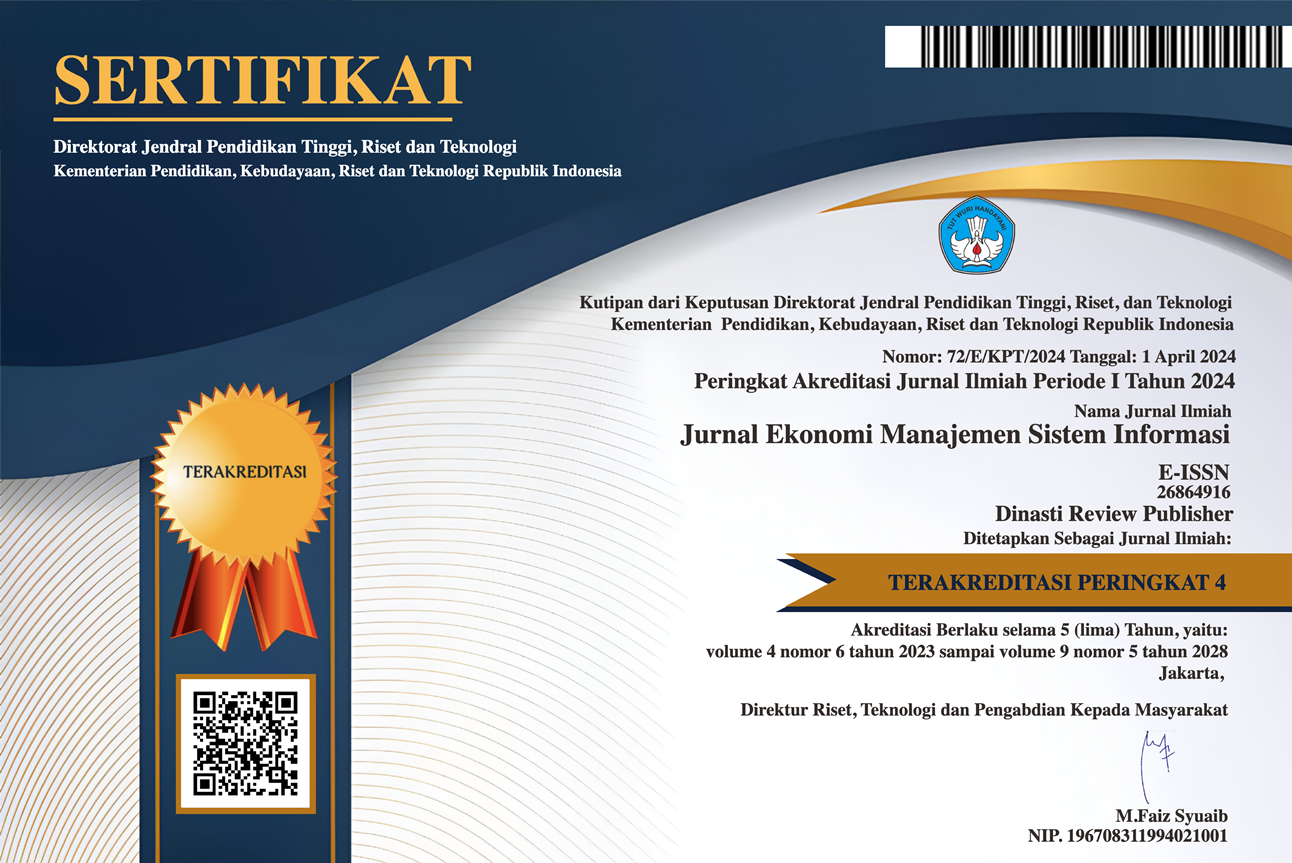Analisis Pengaruh Trainee Experience, Work Environment, dan Trainee Motivation terhadap Kinerja Karyawan di Grup Analisa Risiko Kredit PT MNO dengan Transfer Training Sebagai Variabel Mediator
DOI:
https://doi.org/10.38035/jemsi.v6i6.5768Keywords:
Trainee Experience, Work Environment, Trainee Motivation, Transfer Training, Work Performance, SEM-PLSAbstract
Tujuan penelitian ini adalah untuk menganalisis pengaruh pengalaman pelatihan (Trainee Experience), lingkungan kerja (Work Environment), dan motivasi trainee (Trainee Motivation) terhadap kinerja karyawan di Grup Analisa Risiko Kredit PT MNO, dengan transfer pelatihan (Transfer Training) sebagai variabel mediator. Metode penelitian yang digunakan adalah pendekatan kuantitatif dengan pengumpulan data melalui survei kuesioner kepada karyawan yang telah lulus dari program pelatihan Grup Analisa Risiko Kredit di PT MNO selama tahun 2021-2024. Analisis data dilakukan menggunakan teknik Structural Equation Modeling – Partial Least Squares (SEM-PLS). Dari kuesioner dan analisis yang telah dilakukan, diketahui bahwa Trainee Experience dan Work Environment memiliki pengaruh signifikan terhadap Transfer Training. Variabel Trainee Experience juga berpengaruh positif dan signifikan terhadap Work Performance. Selain itu, Transfer Training berperan sebagai mediator yang memperkuat hubungan antara variabel Trainee Experience dengan kinerja karyawan. Dari hasil tersebut, dapat diindikasikan bahwa pelatihan yang efektif serta lingkungan yang mendukung sangat berpengaruh dalam meningkatkan performa karyawan di industri perbankan.
References
Alawneh, S. (2008). The impact of human resource management practices on organizational performance: A study of private sector organizations in Jordan. International Journal of Productivity and Performance Management, 57(6), 498–512. https://doi.org/10.1108/17410400810882430
Alfara, R., Setiawan, M., & Febrian, E. (2022). The role of motivation and self-efficacy on employee performance: Evidence from Indonesia. Journal of Business and Management, 24(1), 17–29.
Arya, P., Patel, N., & Sharma, R. (2023). Impact of workplace environment on employee productivity: Evidence from service sector. Journal of Organizational Behavior, 44(2), 112–129.
Bandura, A. (1977). Social learning theory. Prentice-Hall.
Baldwin, T. T., & Ford, J. K. (1988). Transfer of training: A review and directions for future research. Personnel Psychology, 41(1), 63–105. https://doi.org/10.1111/j.1744-6570.1988.tb00632.x
Bhatti, M. A., Battour, M. M., Sundram, V. P. K., & Othman, A. A. (2021). Transfer of training: Does it truly happen? An examination of support, instrumentality, and learning outcomes as predictors. European Journal of Training and Development, 45(5/6), 447–465. https://doi.org/10.1108/EJTD-06-2020-0110
Blume, B. D., Ford, J. K., Baldwin, T. T., & Huang, J. L. (2010). Transfer of training: A meta-analytic review. Journal of Management, 36(4), 1065–1105. https://doi.org/10.1177/0149206309352880
Dabale, W. P., Jagero, N., & Nyauchi, M. (2014). The relationship between training and employee performance: A case study of Mutare City Council, Zimbabwe. International Journal of Human Resource Studies, 4(4), 61–72. https://doi.org/10.5296/ijhrs.v4i4.6620
Elnaga, A., & Imran, A. (2013). The effect of training on employee performance. European Journal of Business and Management, 5(4), 137–147.
Farah Shaikh, S. (2023). The influence of work environment on employee performance in the banking sector of Pakistan. Pakistan Journal of Human Resource Management, 8(1), 33–47.
Ford, J. K., Yelon, S., & Billington, A. Q. (2018). Transfer of training: Building bridges between theory and practice. Annual Review of Psychology, 69, 129–151. https://doi.org/10.1146/annurev-psych-122216-011438
Gegenfurtner, A. (2011). Motivation and transfer in professional training: A meta-analysis of the moderating effects of knowledge type, instruction, and assessment conditions. Educational Research Review, 6(3), 153–168. https://doi.org/10.1016/j.edurev.2011.04.001
Ghozali, I. (2014). Structural Equation Modeling Metode Alternatif dengan Partial Least Square (PLS) (4th ed.). Badan Penerbit Universitas Diponegoro.
Grohmann, A., & Kauffeld, S. (2020). Evaluating training effectiveness: An integrated model for evaluation of training transfer. Human Resource Development Review, 19(1), 56–80. https://doi.org/10.1177/1534484319897055
Izzaty, N. I. (2021). The role of managerial support in facilitating transfer of training: The mediating role of learning motivation. Journal of Human Resource Development, 12(2), 88–100.
Jayusman, J., & Shavab, M. (2020). Pengantar metode penelitian kuantitatif. Jurnal Ilmu Sosial, 12(1), 1–11.
Kashif, M., Javed, S., & Hashmi, H. (2020). Employee training and performance: Empirical evidence from the service sector. International Journal of Organizational Leadership, 9(3), 86–99.
Kauffeld, S., & Lehmann-Willenbrock, N. (2010). Meetings matter: Effects of team meetings on team and organizational success. Small Group Research, 41(2), 130–154. https://doi.org/10.1177/1046496409358459
Kraiger, K., Ford, J. K., & Salas, E. (2004). The science of training and development in organizations: What matters in practice. Psychological Science in the Public Interest, 13(2), 74–101. https://doi.org/10.1111/j.1539-6053.2004.00019.x
Muhammad Ishtiaq Khan, M., Shahid Ali, S., & Sarfraz, A. (2024). The impact of motivation and work environment on transfer of training and employee performance in the banking sector. Journal of Human Capital Development, 17(1), 65–81.
Nafukho, F. M., Hairston, N., & Brooks, K. (2022). Transfer of learning: A critical review of theories and empirical research. Human Resource Development Quarterly, 33(2), 123–143. https://doi.org/10.1002/hrdq.21468
Noe, R. A. (2020). Employee training and development (8th ed.). McGraw-Hill Education.
Pudjiarti, S., Saputra, D., & Haryono, S. (2019). The effect of training transfer and work environment on employee performance mediated by work motivation. Jurnal Manajemen Indonesia, 19(1), 1–12.
Rampun, R., Zainol, Z., & Tajuddin, D. (2021). The effects of training transfer on training program evaluation and effectiveness of training program. Journal of Human Resource and Sustainability Development, 9(3), 122–138.
Rabuana, D., & Yanuar, R. (2023). The role of organizational support in enhancing employee performance through transfer of training. Journal of Business Research and Practice, 11(2), 45–59.
Salas, E., Tannenbaum, S. I., Kraiger, K., & Smith-Jentsch, K. A. (2020). The science of training and development in organizations: What matters in practice. Annual Review of Organizational Psychology and Organizational Behavior, 7, 199–224. https://doi.org/10.1146/annurev-orgpsych-032119-045309
Sarfraz, A., Shahid Ali, S., & Khan, M. I. (2021). The effect of organizational justice and supervisor support on training transfer: The mediating role of motivation to transfer. International Journal of Training and Development, 25(4), 307–322. https://doi.org/10.1111/ijtd.12248
Shahid Ali, S., Khan, M. I., & Sarfraz, A. (2022). Motivation to learn and training transfer: The role of self-efficacy and learning orientation. Journal of Organizational Behavior, 43(5), 678–693.
Sholihin, M., & Ratmono, D. (2013). Analisis SEM-PLS dengan WarpPLS 3.0 untuk hubungan nonlinier dalam penelitian sosial dan bisnis. Andi Publisher.
Siwi, R. (2021). Validitas dan reliabilitas dalam penelitian kuantitatif. Jurnal Metodologi Penelitian, 5(2), 45–52.
Sugiyono. (2016). Metode penelitian kuantitatif, kualitatif, dan R&D. Alfabeta.
Velada, R., Caetano, A., Michel, J. W., Lyons, B. D., & Kavanagh, M. J. (2017). The effects of training design, individual characteristics and work environment on transfer of training. International Journal of Training and Development, 11(4), 282–294. https://doi.org/10.1111/j.1468-2419.2007.00286.x
Vignoli, M., & Depolo, M. (2024). Trainee proactive behavior and training transfer: The mediating role of self-regulation. Human Resource Development Quarterly, 35(1), 33–57.
Wijoyo, D. (2021). Pengukuran kinerja karyawan berbasis indikator kecepatan kerja. Jurnal Manajemen Bisnis, 18(1), 55–70.
Zhenjing, L., Hongli, W., & Xue, L. (2022). Relationship between work environment, organizational support, and employee performance in China’s service industry. Asia Pacific Journal of Human Resources, 60(3), 457–478.
Downloads
Published
How to Cite
Issue
Section
License
Copyright (c) 2025 Ignatius Ivan Sulaksono, Eric Harianto

This work is licensed under a Creative Commons Attribution 4.0 International License.
Hak cipta :
Penulis yang mempublikasikan manuskripnya di jurnal ini menyetujui ketentuan berikut:
- Hak cipta pada setiap artikel adalah milik penulis.
- Penulis mengakui bahwa Jurnal Ekonomi Manajemen Sistem Informasi (JEMSI) berhak menjadi yang pertama menerbitkan dengan lisensi Creative Commons Attribution 4.0 International (Attribution 4.0 International CC BY 4.0) .
- Penulis dapat mengirimkan artikel secara terpisah, mengatur distribusi non-eksklusif manuskrip yang telah diterbitkan dalam jurnal ini ke versi lain (misalnya, dikirim ke repositori institusi penulis, publikasi ke dalam buku, dll.), dengan mengakui bahwa manuskrip telah diterbitkan pertama kali di Jurnal Ekonomi Manajemen Sistem Informasi (JEMSI).










































































